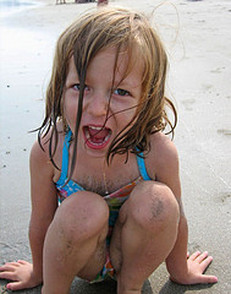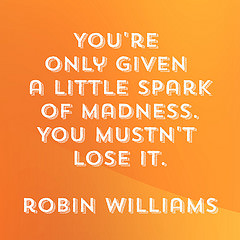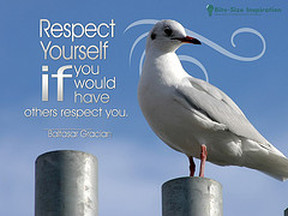|
I have spent a great deal of time living through my son's mental illness and trying to cope. It is difficult for a parent to watch their child suffer and know that there is very little they can do to help. There is no book to consult for raising a child with mental illness. It is a guessing game, and one full of trials and errors. I often felt judged by others, even medical professionals, and wondered what I had done wrong as a mother. I have tried to convey how I felt, but I'm not always sure the words show the terror I endured.
I was tired of the chaos. Up and down, happy and sad, angry and controlled. I didn’t have an answer for how to respond to Matthew’s moods. How much more of his anger could I take? The stress of having Matthew happy one day and unhappy the next left me continually on guard. The constant pressure of trying to figure out his mood drained me of energy. No parents look at their child and imagine what could go wrong in their life. Instead, we see hope for the future. We dream that our child will be perfect and love us the way we love them. We don’t ever imagine that our child will be harmed by others or tormented by his or her own mind. Nobody is perfect, and our child can’t be perfect either, but we are prepared for imperfection. No parents are prepared to learn that their child has been abused and may have something seriously wrong with him or her that could change their inner core, their ability to love, their ability to empathize with others. These were things I faced with Matthew. He had changed-was changing-into someone I didn’t know. I wanted to help him, but he blamed me for helping him. I knew keeping him alive, even if it meant he hated me, was my only option. I was willing to do whatever it took. There are no words to describe the fear that gripped me day after day, the absolute knowledge I had that if I did not react quickly, my child would be dead by his own hand; of this I was absolutely sure. I wanted to flee from my life and the course it was taking. I haven't spent much time thinking about what it must be like for a sibling to watch their brother or sister suffer through a mental illness. I have tried to protect my daughter from the chaos of our lives, but I didn't think about all the ways it could affect her until I read a blog that was posted after Robin Williams died. Shannon O'Dell, who wrote the blog, described what it was like to be the sister of someone with a mental illness and it helped me to appreciate the difficulties my daughter has been through with her brother. Her final sentences sum up how most people who are living with a loved one who has a mental illness feels, "I know that I want to give up sometimes. I know that I want to blame. I know that I want to scream try harder, do better, stop hurting yourself. I know that I am making mistake after mistake." To read the full blog click on the link below. http://www.chickensinmykitchen.com/2014/08/mental-illness-as-character-defect.html?spref=fb We go through life trying to get ahead, trying to be the best, trying to survive. What we need is to understand, have compassion, and empathize. Only then will we get ahead, be the best, and thrive, not just survive. RECOGNIZE, REEDUCATE, REDUCE the stigma of mental illness. Do those who have a mental illness and commit suicide die from the illness or a choice? After the sudden death of Robin Williams there has been debate on whether suicide is a choice for those with a mental illness. I honestly don't think anyone is able to judge what another person is going through or what is going on in that person's mind. To think you know exactly what someone else is feeling is ludicrous. In some instances of mental illness suicide may be a choice. When my son was battling severe depression he often wrote about his feelings. It appeared at times that he would have chosen death if given the opportunity as he wrote here, "Demand for the cure. A cure for such an incredible amount of suffering, that has brought me nothing but agony. Death is my choice to rid me of my penalty." This is not to say he would have chosen it lightly. The depths of despair that must come with the thoughts of ending it all can only be felt by that individual experiencing the despair. Another person could never know how they would react if faced with the same misery, or even if their misery is the same. No one chooses to feel suicidal, no one chooses to endure a mental illness, and in the abyss of depression there often is no choice to feel happiness, excitement, or hope. I believe hope is often taken out of the equation, because when the mind is so utterly despondent it can not think forwardly or outwardly, it probably isn't thinking much at all. There were times, when it seemed that my son had no control over his actions, and therefore no choice. And during those times he wrote, “Hopeless, no point in continuing. Hope for a change. There is no hope. No god. No one to help us. No one to stop us. No one to save us from ourselves. This is out. Out of our control. I want to choose life, but death keeps pulling me back under and suffocating me."  Do I have all the answers? No. Do I know what it's like to be on the brink of suicide? No. Can I tell you that if I was severely depressed and suicide seemed the only path forward that I would be able to choose not to kill myself? No. The common factor? No. No one knows what it is like to be on the precipice of suicide and then to kill yourself, no one can tell you how they felt or whether they had a choice, because they are no longer here. To say "Robin Williams didn't die from a disease, he died from his choice" is saying that you know what he felt and what he was thinking. It is to say that the disease wasn't relevant enough to have killed him inside already, before his body was killed. It is to say that you are a mind reader. It is to say that you are a god, and we know that is not true. Is there hope out there for those who struggle with severe, debilitating depression? Absolutely! There will always be hope, but maybe not control or dare I say it? Choice.  We just took our youngest child to college and now my husband and I are in our house alone, except of course for our furry children. Many people feel sadness and loss when their children leave the house. I am sad to see my daughter go, but I am also excited about what her new life will bring her. I have spent many years preparing my children for the day when they will leave home. We were in the grocery store buying products for college. One item we purchased was laundry soap. The young man bagging our groceries heard our conversation about college and as he put the laundry soap in the bag he said to my daughter, "So how many times have you actually done your own laundry?" I was proud that she could respond, "I have been doing my own laundry for several years." Doing your own laundry may be a small thing, but it is one step toward independence. My daughter can also cook, buy her own groceries, and clean a bathroom. She spent her senior year of high becoming more self-sufficient, after asking us to allow her to make more decisions on her own. She agreed to accept the consequences of her actions and she learned valuable lessons throughout the year as well as growing in maturity.
A Psychology Today article said, "Independence is a gift you give your children that they will cherish and benefit from their entire lives. You can provide your child with several essential ingredients for gaining independence:
Now that my children are independent, I want to make sure to keep myself from feeling lonely and missing my job of parenting. I plan on engaging in many activities, enjoying the bonds of friendships I have made, and building other relationships. I didn't want to be the parent that was pictured in the illustration to the right. I wanted to be able to send my children out into the world prepared for the future, knowing I had done my job as a parent.
http://www.helpguide.org/mental/suicide_prevention.htm
Remember "laughter is the best medicine." Robin Williams, you will be missed. Unless you are clinically depressed, being happy is a choice. Often we say, "When the next thing comes along, or after I get that job or this house, I will be happy." But the choice to be happy is in our control. We can choose how we want to feel. There are many ways to find happiness in our lives. A great article written in 2012 on Wikihow titled, "How To Be Happy:12 Steps," gives excellent information on finding happiness. Follow the link to read the full article When you interact with people who share your interests, you feel happier due to sensations of reward and well-being. This is because during such interactions, serotonin and dopamine — neurotransmitters responsible for feelings of happiness and relaxation — are released into the body. In other words, your body is designed to feel happier when engaged in social interactions...... ..http://www.wikihow.com/Be-Happy If none of these twelve steps work for you to find happiness then there is an app for happiness. Happify is an app for "emotional fitness." Katie Couric recently wrote an article about this new app. "Happify is a digital tool that offers science-based games and activities to boost your level of happiness. 'The idea here and the innovation about Happify is, start thinking about your emotional fitness as important as your physical fitness,' says co-founder Ofer Leidner." http://news.yahoo.com/katie-couric-happify-222938746.html?mktg=ykatie-sem-ybn-generic&prop=ykatie&chan=sem&ptnr=ybn&cmp=generic&device=c&kw=being%20happy&adid=5372903970&sid=sr3_8934397_ms So if you need more help check out Happify. http://www.happify.com/ "One negative comment can ruin your entire day, that is because the brain is hardwired to remember the negative interactions better than the positive ones. Higher regions of the brain can modify how the lower regions function. We can use our intention and our attention in sustained, focused ways to overcome the brains negative bias, so it can be in our control how bad experiences affect us. Unless you are clinically depressed, being unhappy may be a choice."--TNT, Perception
After writing the blog this week on verbally abusive children I thought about what the mother must have said to her child as they headed to their car. The boy kept repeating, "Don't tell daddy, don't tell daddy." This implied to me that the mother said, "Wait until your father gets home and I tell him what you said." I thought about my own childhood and remembered many times when I heard, "Wait until your father gets home." It was a phrase that filled me with dread. I understand why my mother said it. She had three small children in the house and she had to manage all day on her own, so she left the discipline to my father. I never thought about how this may have affective my father until recently. Did he worry at work that he would have to come home and punish one of his children? Did he come home late to avoid being the disciplinarian? Did he want to be freed from this role, but didn't know how?
Taking the role of punishing your children is not a task any parent dreams of. Of course someone has to do it on occasion, but it doesn't seem fair to let the person who doesn't see the kids all day come home and be the "bad guy." On the other hand, it is unfair for the person who looks after the children on a regular basis to always be the disciplinarian. There needs to be a middle point. Why do we discipline our children? According to pediatrics and child health "Discipline is the structure that helps the child fit into the real world happily and effectively. It is the foundation for the development of the child’s own self-discipline. Effective and positive discipline is about teaching and guiding children, not just forcing them to obey. As with all other interventions aimed at pointing out unacceptable behaviour, the child should always know that the parent loves and supports him or her. Trust between parent and child should be maintained and constantly built upon. Parenting is the task of raising children and providing them with the necessary material and emotional care to further their physical, emotional, cognitive and social development. Disciplining children is one of the most important yet difficult responsibilities of parenting, and there are no shortcuts. The goal of effective discipline is to foster acceptable and appropriate behaviour in the child and to raise emotionally mature adults. The foundation of effective discipline is respect. The child should be able to respect the parent’s authority and also the rights of others. Inconsistency in applying discipline will not help a child respect his or her parents. Harsh discipline such as humiliation (verbal abuse, shouting, name-calling) will also make it hard for the child to respect and trust the parent. Thus, effective discipline means discipline applied with mutual respect in a firm, fair, reasonable and consistent way. The goal is to protect the child from danger, help the child learn self-discipline, and develop a healthy conscience and an internal sense of responsibility and control. It should also instill values." http://www.ncbi.nlm.nih.gov/pmc/articles/PMC2719514/?report=reader The next time you are thinking about telling your child to wait until the other parent gets home, stop and think. Is this what you want to teach your child? Respect each other as parents and mirror this behavior to your child, this will produce respect in them and lead to appropriate behavior.  I was behind a mother and son in the check out line of Target the other day. The child was maybe four years old and young enough to be in the shopping cart. When the mother finished paying she moved the cart forward and stopped because the boy wanted to see something at the end of the lane. She let him peruse the items for a few moments and then told him they needed to go as she began to push the cart. The child screeched that he didn't want to leave and reached for whatever fascinating merchandise he was admiring. The mother said, "No, we have to go." The boy turned to his mother, looked her straight in the eyes and said with venom in his voice, "you bitch!" The Target employee and I were right behind this woman and clearly heard what was said. I noticed a few other people with baffled expressions glance over in her direction. The mother looked visibly upset and said something to the child that I could not hear. I paid for my items and was out the door, once again behind the mother and her child. She chastised him for his remarks and must have told him she would tell his father, because all I heard on the way to my car was his pleading not to tell daddy. Kids repeat words and phrases they hear all the time. The words this child used did not shock me as much as his tone and how it was directed toward his mother, as if he had heard someone speak to her in exactly that way. When I came home from Target I repeated the scenario to my eighteen year old daughter and she said, "Wow, it sounds like the boy has heard his father say that to his mother." I was surprised how perceptive my daughter was, because that is exactly what I was thinking.
Children that witness abusive behavior often normalize and minimize it and then repeat the behavior. This can lead down an unhealthy path of abuser or victim of abuse. Renowned child behavior therapist James Lehman said, "When we raise our children, we are teaching them 24 hours a day, 7 days a week, whether we think they're learning from us or not. Children watch adults for a living. What parents don't always understand is that chronic defiance in children develops over time, after certain lessons are learned and it can start very early on." The most powerful thing James Lehman says on this subject is "The reason why we need to step in and help them change their ineffective way of dealing with life's problems is because the more we give power to inappropriate, verbally abusive, behavior the less prepared that child is going to be to solve life's problems as an adult. Make no mistake about it, children who use verbal abuse, name-calling, cursing and intimidation, become verbally abusive adults." Remember your children are watching you 24/7, be the person you want them to be. To read more articles by James Lehman follow the link http://www.empoweringparents.com/author_display.php?auth=James-Lehman |
Archives
January 2019
Click on the RSS Feed link above to follow my blog
|





 RSS Feed
RSS Feed